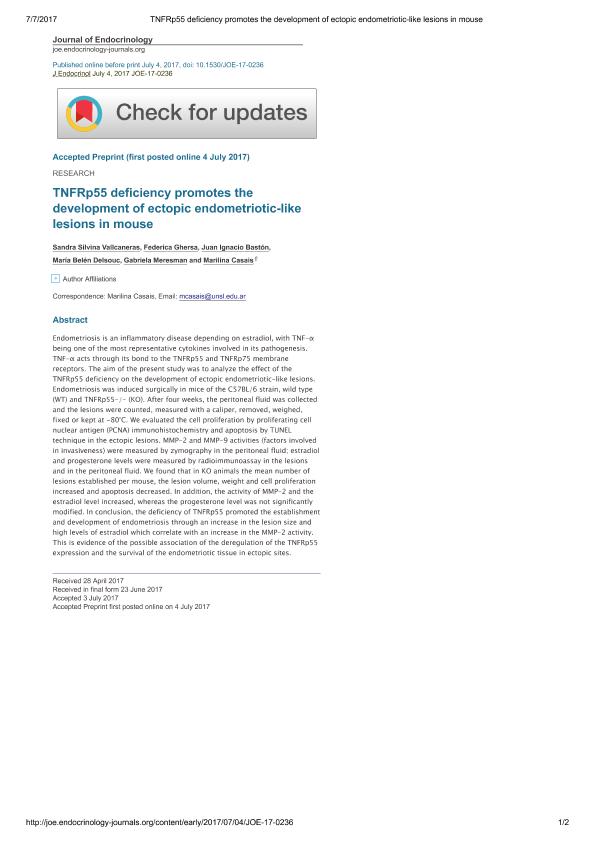Artículo
TNFRp55 deficiency promotes the development of ectopic endometriotic-like lesions in mice
Vallcaneras, Sandra ; Ghersa, Federica
; Ghersa, Federica ; Baston, Juan Ignacio
; Baston, Juan Ignacio ; Delsouc, María Belén
; Delsouc, María Belén ; Meresman, Gabriela Fabiana
; Meresman, Gabriela Fabiana ; Casais, Marilina
; Casais, Marilina
 ; Ghersa, Federica
; Ghersa, Federica ; Baston, Juan Ignacio
; Baston, Juan Ignacio ; Delsouc, María Belén
; Delsouc, María Belén ; Meresman, Gabriela Fabiana
; Meresman, Gabriela Fabiana ; Casais, Marilina
; Casais, Marilina
Fecha de publicación:
04/07/2017
Editorial:
BioScientifica
Revista:
Journal of Endocrinology
ISSN:
0022-0795
e-ISSN:
1479-6805
Idioma:
Inglés
Tipo de recurso:
Artículo publicado
Clasificación temática:
Resumen
Endometriosis is an inflammatory disease depending on estradiol, with TNF-α being one of the most representative cytokines involved in its pathogenesis. TNF-α acts through its bond to the TNFRp55 and TNFRp75 membrane receptors. The aim of this study was to analyze the effect of the TNFRp55 deficiency on the development of ectopic endometriotic-like lesions. Endometriosis was induced surgically in mice of the C57BL/6 strain, wild type (WT) and TNFRp55−/− (KO). After four weeks, the peritoneal fluid was collected and the lesions were counted, measured with a caliper, removed, weighed, fixed or kept at −80°C. We evaluated the cell proliferation by proliferating cell nuclear antigen (PCNA) immunohistochemistry and apoptosis by TUNEL technique in the ectopic lesions. MMP-2 and MMP-9 activities (factors involved in invasiveness) were measured by zymography in the peritoneal fluid; estradiol and progesterone levels were measured by radioimmunoassay in the lesions and in the peritoneal fluid. We found that in KO animals the mean number of lesions established per mouse, the lesion volume, weight and cell proliferation increased and apoptosis decreased. In addition, the activity of MMP-2 and the estradiol level increased, whereas the progesterone level was not significantly modified. In conclusion, the deficiency of TNFRp55 promoted the establishment and development of endometriosis through an increase in the lesion size and high levels of estradiol which correlate with an increase in the MMP-2 activity. This is evidence of the possible association of the deregulation of the TNFRp55 expression and the survival of the endometriotic tissue in ectopic sites.
Palabras clave:
Endometriosis
,
Tnf
,
Estradiol
,
Mouse Model
Archivos asociados
Licencia
Identificadores
Colecciones
Articulos(IBYME)
Articulos de INST.DE BIOLOGIA Y MEDICINA EXPERIMENTAL (I)
Articulos de INST.DE BIOLOGIA Y MEDICINA EXPERIMENTAL (I)
Citación
Vallcaneras, Sandra; Ghersa, Federica; Baston, Juan Ignacio; Delsouc, María Belén; Meresman, Gabriela Fabiana; et al.; TNFRp55 deficiency promotes the development of ectopic endometriotic-like lesions in mice; BioScientifica; Journal of Endocrinology; 234; 3; 4-7-2017; 269-278
Compartir
Altmétricas



